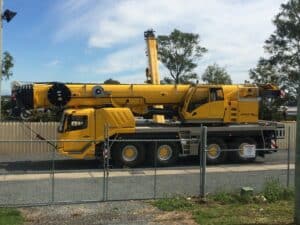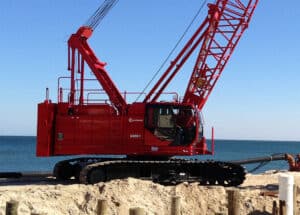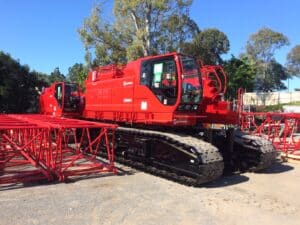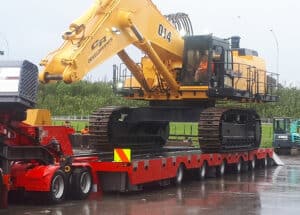Looking Into The Future Of HVO-Powered Cranes

Why HVO-powered cranes?
Hydrotreated Vegetable Oil (HVO) is a 100 per cent renewable fuel source that the crane industry has developed to work with a new line of cranes. The industry amongst others that are heavily reliant on fossil fuels which are harming the environment is seeking environmentally friendly and sustainable replacements that will not compromise the performance that fossil fuels provide.
Whilst the future for battery-powered cranes is being currently being explored, it still has challenges to overcome on how it can become fully environmentally friendly and stable.
What is HVO?
Hydrotreated Vegetable Oil (HVO) is a renewable diesel fuel that can be made from any plant-based oil. HVO is chemically similar to fossil diesel, but it has a significantly lower carbon footprint.
HVO is produced by hydrotreating vegetable oil, which is a process of breaking down the oil molecules into shorter, more stable molecules. This process also removes impurities from the oil, making it a cleaner-burning fuel.
HVO can be used in any diesel engine with little or no modification. It can also be blended with fossil diesel in any proportion.
HVO differs from diesel in that it has a lower carbon footprint and produces less air pollution, including fewer greenhouse gases. It also has a higher energy density, meaning that it contains more energy per unit volume than fossil diesel. This means that HVO can help to improve fuel economy.
HVO is a promising alternative to fossil diesel, and it is already being used by a number of companies and fleets around the world.
The benefits of HVO-powered cranes
The main benefit of HVO fuel is the reduction in CO2 emissions. A 5-axle mobile crane which permanently uses pure HVO has a reduction in CO2 emissions by up to 74% compared to diesel fuel, if we take the full life of the crane including its production into account.
Liebherr released an official list of the benefits that HVO provides when being used with their cranes:
- No modifications are required
- Good compatibility with all engine components
- HVO can be mixed with fossil diesel in any ratio for use in conventional internal combustion engines
- That means that even older Liebherr machines in global fleets can be operated on an essentially climate-neutral basis using HVO
- Very good low-temperature resistance (down to at least -20 °C)
- Reduced use of Adblue (around -10 %)
- Lower emissions of nitrogen oxides (around -11 %) and particulates
- Lower soot particle emissions, especially in cranes without diesel particulate filters
For other producers of cranes check with the manufacturer whether your model is compatible with HVO fuel or requires some modifications to make it compatible.
The Challenges of HVO-powered cranes
As the use of HVO-powered cranes continues to grow, so too do the challenges associated with their use. One of the most significant challenges is the lack of a standardised testing and certification process for HVO-powered cranes. This means that there is no guarantee that an HVO-powered crane will perform to the same standards as a traditional diesel-powered crane.
Another challenge is the lack of trained operators. HVO-powered cranes require a different operating procedure from diesel-powered cranes, and not all operators are familiar with the necessary techniques. This can lead to safety issues and potential damage to the crane.
The cost of HVO-powered cranes can also be a challenge. HVO is more expensive than traditional diesel fuel, and this cost is passed on to the customer. HVO-powered cranes also tend to have a shorter lifespan than their diesel counterparts, meaning that they may need to be replaced more often.
Despite the challenges, HVO-powered cranes offer a number of advantages that make them an attractive option for many businesses. HVO is a cleaner burning fuel than diesel, meaning that it produces fewer emissions. This can have a positive impact on both the environment and the health of those working near the crane. HVO-powered cranes also tend to be more efficient than diesel-powered cranes, meaning that they can save money on fuel costs over time.
With the right training and preparation, the challenges associated with HVO-powered cranes can be overcome. businesses that are considering using HVO-powered cranes should work with a reputable supplier that can provide the necessary support and training. By doing so, they can ensure that their crane fleet is safe, efficient, and cost-effective.
The potential for new HVO technology to improve the power and performance of cranes
A new type of Hydrotreated Vegetable Oil (HVO) is set to revolutionize the power and performance of cranes, according to a new study.
The study, conducted by the University of Sheffield, showed that HVO could potentially increase the power output of cranes by up to 20%.
This would be a significant improvement on the current performance of cranes, which are often limited by the amount of fuel they can carry.
HVO is a renewable, sustainable fuel that is made from vegetable oil. It is already being used in a number of applications, such as powering vehicles and generators.
The study found that HVO could be used in cranes to improve their power and performance. The research team believes that HVO could be used in a number of other applications, such as powering ships and aeroplanes.
The potential for HVO to improve the power and performance of cranes could have a significant impact on the construction industry, as well as the transport sector.
The use of HVO in cranes would reduce emissions, as well as the amount of fuel required to power the crane. This would lead to a reduction in the cost of operating cranes, as well as the environmental impact.
Is HVO power really more environmentally friendly?
Hydrotreated vegetable oil (HVO) is a new type of renewable diesel that is being promoted as a more environmentally friendly alternative to traditional diesel. HVO is made from vegetable oils or animal fats that have been chemically treated to remove impurities. The resulting product is a clear, colourless liquid that can be used in diesel engines without any modifications.
HVO is said to have a number of benefits over traditional diesel, including improved engine efficiency and lower emissions of carbon dioxide, nitrogen oxides, and particulate matter. Additionally, HVO can be blended with traditional diesel in any proportion, making it a drop-in replacement for diesel fuel.
Critics of HVO point out that the production process for HVO emits large amounts of carbon dioxide and other greenhouse gases. Additionally, HVO is not currently produced in large enough quantities to make a significant impact on the overall demand for diesel fuel.
It remains to be seen whether HVO will live up to its promise as a more environmentally friendly alternative to traditional diesel. In the meantime, it is important to remember that any fuel, whether it is HVO or traditional diesel, has an impact on the environment.





